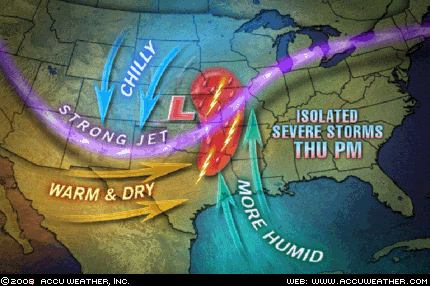 Hurricane-force winds, hail and heavy rain, generated in response to a strong jet stream, are battering the Plains. Near-blizzard conditions will also affect Wyoming and the Dakotas. The long-range weather forecast for this period, posted on The Weather Alternative back in April, warned of this storm system in its comment for May 3-5.
Hurricane-force winds, hail and heavy rain, generated in response to a strong jet stream, are battering the Plains. Near-blizzard conditions will also affect Wyoming and the Dakotas. The long-range weather forecast for this period, posted on The Weather Alternative back in April, warned of this storm system in its comment for May 3-5. The long-range forecast called for "a storm system with energetic winds over the Plains." That is certainly happening although a bit earlier than expected. This forecast was based on Mercury's parallel aspect to Mars (which usually excites high winds) and Mercury's square to Saturn.

Since a key astrological chart places Saturn's influence over the Great Basin and Rockies the forecast for May 2-5 called for major storm activity over the West Coast, Intermountain West, and Rockies. As can be seen in the Accuweather map at right, the northern Rockies is being affected by the combination of an upper-level trough, cold air, and a storm system over the central Plains that will bring snow and wind over the northern Rockies.
 This next Accuweather graphic shows the invasion of cold air over the Rockies that is so characteristic of Saturn's astro-meteorological influence.
This next Accuweather graphic shows the invasion of cold air over the Rockies that is so characteristic of Saturn's astro-meteorological influence.
Summer 2008: The West Coast Part 1
Summer 2008: The Rockies Part 1
Introduction to the Weather Alternative
How Long-Range Forecasts Are Made
Temperature Monitors Report Widescale Global Cooling
Junk Science: The Great Global Warming Race
Thursday, May 01, 2008
By Steven Milloy
Can global warming’s vested interests close the deal on greenhouse gas regulation before the public wises up to their scam?
A new study indicates alarmist concern and a need to explain away the lack of actual global warming. Researchers belonging to the U.N. Intergovernmental Panel on Climate Change, or IPCC, reported in Nature (May 1) that after adjusting their climate model to reflect actual sea surface temperatures of the last 50 years, "global surface temperature may not increase over the next decade, as natural climate variations … temporarily offset the projected anthropogenic warming." read more
No comments:
Post a Comment